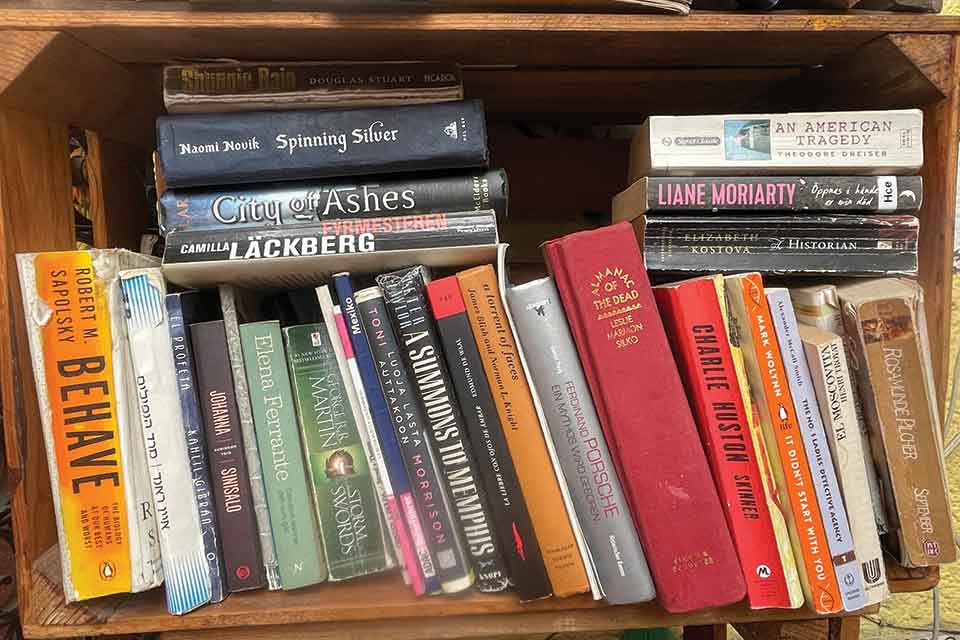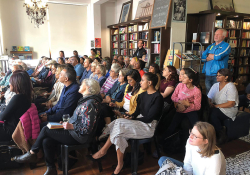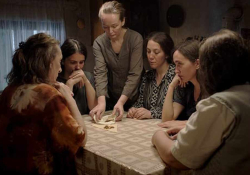Tethers: A Traveler’s Ode to Book Swaps, Big and Small

A frequent traveler currently winding her way through Central America celebrates the free book swaps along the way, and all the hope and longing nestled amongst their shelves.
I’ll speak of cathedrals. Of sandwiches and cobblestone, of midnights spent in hot springs and the red sands of the Namib slipping through my fingers. When I return home at last, I will remember most strongly the moments of discovery, of catharsis, of flavor, and share them too often with exasperated loved ones. I will not speak of the books that I read along the way, though they filled the crevices of my days. And least of which will I speak of the bookshelves I found them on, the dusty book swaps in hostel common areas and corner cafés that I frequented, though they too were moments of discovery and catharsis. I will forget them, in time, as they quietly fade to make space for more cathedrals, more natural wonders. But these shelves do not mind the forgetting. Give, take: that is all they ask.
For the perennial traveler, a book swap is more than a minute of respite from the babel outdoors, a freebie when the last of one’s coins have been spent on a museum ticket, a street snack, shampoo. A book swap is a new town without a map; a treasure hunt for the sword-shy. If I have the afternoon to linger, a book swap is window shopping the streets of Oaxaca, or selecting the perfect flavor of gelato on a hot day. If I’ve a bus to catch, or a hangover nestled between my brows, it is frustrating and terribly high-stakes: a fillet knife sliding down the delicate spine of a mackerel.
A book swap is a new town without a map; a treasure hunt for the sword-shy.
On these shelves, there is no pecking order. Here gathers a ménage of authors who would, in your typical bookstore, live on opposite walls, split by genre and popularity, by surname and sales price. Much like the way I share this cramped dorm room with travelers from South Korea, Argentina, Australia, Trinidad and Tobago; that most private space, shared for one night with people of different languages and histories who would otherwise live a world apart, a single point of contact before we scatter across continents. I imagine the evenings, if these authors whisper to one another like we do, two strange soirées swapping gossip in the dark.
Far from the hands of booksellers and publicists, a book swap is a step back in time, before best-seller lists and starred reviews, before book banners flashing bright in our webpage margins. It does not matter who designed the cover or endorsed it on Twitter or how many awards it won. For those of us mad enough to be authors by trade, this is an encouraging thought. It is the book business distilled to its purest form: a writer writes a story, a reader reads it. It is a chance for us—not for sales, nor recognition; the units on our P&Ls will not change—but to finally realize that old dream, to be on the other side of that blessed communion when a young reader finds herself in an author’s words and for a moment stops feeling so scared.
A book swap is a balm for loneliness. It is here at this altar that two dozen hands from two dozen countries have all left an offering. Because that is what it is, to leave a book for another to find: an offering of oneself, a small fraction of one’s hope and longing left like breadcrumbs in the dirt. And when I place my book just so, with a secret kiss to its cover—in that perfect vacancy that book swaps always seem to have, as if they are waiting for just this book to arrive—I imagine the person who will find it, and we are tethered, that reader and I, though we will never know the sound of each other’s laughter. We are tethered to each other and to this great big life, my hope and my longing finding solace in theirs. So when I sit alone at a fountain in Naples or on a shaded bench in Mérida, they are with me, as clearly as if their fingers are in mine. And when in my hostel twin bed I read Aimee Bender by headlamp, she is there with me, telling me about that very particular sadness of lemon cake, and so too am I with the person she told last, and the person before that, and we are tethered, also.
A book swap knows just what we need. On tough days, when we cry in train stations: tales of courage that propel us forward; on days of euphoria, when we pledge never to go back: stories of nostalgia that call us home. So when a book swap gently nudges me toward uncharted genres and unfamiliar authors, I trust it. I listen. I take what it gives me as nutrition, as sustenance, eager hands plucking fruit from a tree. I crack it open, bite into its flesh. I let it drip down my neck and stain my sleeves. I suck on the pit, roll it around on my tongue. I feel the nourishment in my bones. Then, in another city, on another shelf, I plant it and let it grow for another. I displace. I curate.
Yet it is rarely a one-for-one deal. When I arrive at a shelf, often I come empty-handed and have nothing to offer but thanks; other times I am simply leaving, taking nothing, asking in return only shelter for the pages I have come to adore, the characters I have come to know as sisters. But someone will come to remedy what I’ve done, to give when I have taken, to take when I have given. It is this precarious balance that keeps a book swap alive.
So let me tell you why a book swap gives me hope: because everywhere I’ve ever been, I’ve found one. Here is something free for the taking, something wonderful, and yet it is still here, still breathing, ever-changing—growing, even, ever so slightly. Which means someone is giving more than they are taking. Someone is remembering the words of our mothers: Give when you can. Take when you need. Bless what you love as it leaves you. Let it go.












